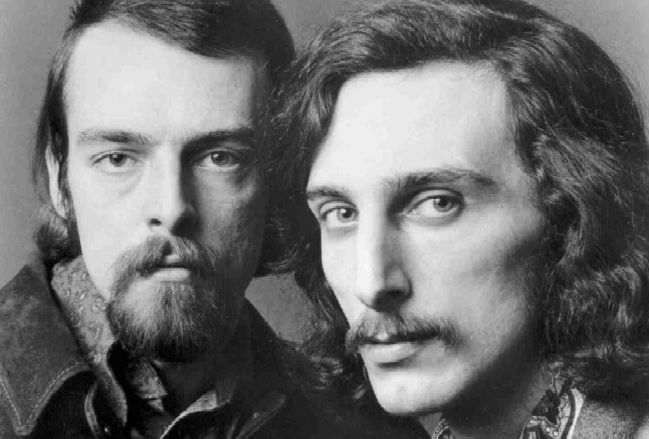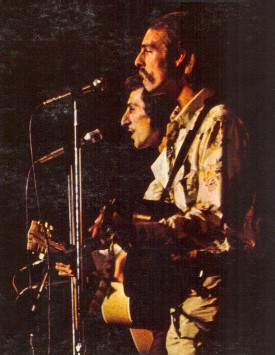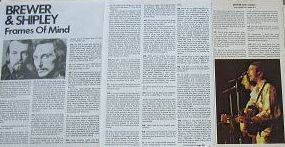|
|
||||||
|
||||||
|
MB:
Doing a good show is just as much if not more a frame of mind as being in
good voice or playing well. When you wrote all those songs you were in
a certain mood. You weren't thinking about performing or being on the
road. You want to get back in that frame of mind to truly communicate. TS: It's best at free concerts and festival situations. I really wish there were more opportunities like that. It's those flashes that come along and bring you back to the origins. You just pick up your guitar and go someplace and sing, just do a guest set, just dropping in someplace, just singing to sing. Now there aren't even that many clubs. The clubs are all closing. Now it's just the big festival situation. MB: We had a perfect example at a concert in Memphis. TS: The concert wasn't good. The number of people who were there and the choice of hall and the sound; things just didn't really come together that well. And we finished the concert and we were kind of let down. Not too far from there in the park they were having - I guess it was the tail end of the Memphis Blues Festival. So we just went down there and asked if we could do a guest show, and we got off. And we had just sung at a concert and nothing happened, we didn't get off at all. We just walked down the street, and there were 2,000 receptive people who were really anxious to hear us sing, and we were really anxious to have some people to sing to, and it became a totally different thing from the concert we had just done. Like two different situations. MB: Audiences vary. For as many times as they love you when you're really bad, they'll hate you when you're really good. What we consider a good concert is totally different from what the audience considers a good concert. A lot of times we personally don't get off, we personally don't think we did a good show, and we may have gotten a standing ovation and three encores. TS: And the reverse is true, too. A lot of times you'll really get off, and the audience is just ... I guess the ideal is a concert where everyone gets off. And that happens too. MB: We had a great time playing in England. Just like anyplace else, some of the shows were really groovy and some of the places weren't so groovy. There's one place we did called the Implosion at the Roundhouse, where everybody has long hair, freaked out, and everybody's really getting off. It's more a festival type scene. TS: The audiences aren't different in their reactions. It's just in the actions they go through to react.
MB:
I did get the impression that a
lot of the audiences over there, especially the really young kids, are just
really flashed on what was going on several years ago. Rock concerts:
people are really into that. People would come up with autograph
books. They're really into a star trip. TS: Our music is influenced a great deal by environment. Every album we've had so far has been a reflection of what's going on in our lives, what we're surrounded with. We very seldom take topics and write about them; we just write what's happening to us at the time. And at that point we'd only been in the United States and Canada, and that's what we've written about.
MB:
Yeah, America really isn't the
center of the universe. After a while you get the feeling that Europe
isn't on the other side of the ocean, it's only on television. TS: And we stayed in one place for two years. Till we were dying to get back on the road again. MB: It almost finished us. We were writing songs for A&M Publishing Co. We ended up recording our first album and left California, started our own publishing company, started a production company based in Kansas City with some friends, called Good Karma Productions, and basically we were just so tired of the whole business scene and the west coast business scene in particular, that we just got together with a bunch of friends with mutual ideas and different talents and decided you just didn't have to sign your life away to all these different people to get things done. We could do it ourselves, with our friends. TS: The songs generally don't just come all at one time. Maybe the thing that ties it all together will. A specific melody may tie the thing together. But it may be weeks or months. There may be some words that you said two months ago that kind of fall into it. I'm not very good at writing on topics. The songs just kind of happen. One day you'll have another song. Sometimes if you have half a song, then you'll sit down and work out the rest of it. But that's about the closest we get to sitting down and writing songs. MB: We never know when we're going to write a song, much less what the song's going to be about. TS: People say "What's the next album going to be like?" and there's no way we can possibly say. A song to me is a song surely before it's finished. You have a song, and you might write another verse to explain what you're talking about in the song after it's there. You can take a song and play it with a rock group, a jazz group, or on kids' toy pianos and kazoo; the arrangements might be different, the key, even the melody might change a little, and you can still tell what the song is. MB: Who knows where they come from? It's all out there. There are only so many notes in the scale, only so many combination of notes, only so many rhythms, only so many words, so I don't think anything is completely original. It's all just floating around out there. It's just a matter of grabbing pieces and sticking pieces together. I don't know where they come from; I wish I knew. How the songs come about; what chemical change happens in your brain or your heart or whatever that makes you come up with a new tune. TS: I don't know if you'd really want to know. MB: Yeah, I would, because I really like to work. I would like to write more. TS: But I have a feeling that what makes a song special is that spontaneity, like just grabbing things, like taking the song that exists rather than trying to make one. I think it's that ability, that folks that have that ability to grab that spontaneous song as it passes by. You know all those people, the songwriters who've been writing songs for years. It would nice to be able to turn on the spontaneity. MB: Yeah, how do you inspire spontaneity? MB: It's hard to be receptive, because you don't want to receive most of the vibrations that are around. You want to shut it off. TS: Or how do I make myself receptive? I think receptiveness is the important thing.
MB:
There was no battle with the FCC
because we refused to react or anything. We couldn't possibly take it
seriously, their statement. It was just harassment on the FCC's part
to try to squelch creativity and freedom of speech. It's funny,
because when we were writing the song, we weren't thinking, "we're trying to
write a controversial song" or anything. It was just another song in
the long line of songs we've written and will write. And we had a lot
of single releases before that time that nothing happened with, so They, the
people, decided to make something out of this song, decided to make this
song a hit for whatever reason. So it was just another song. TS: "What? What is this?" We got to Chicago and all these people were coming up to us, asking us about this controversy, about getting censored. MB: And all we could say was "Well I never thought about it. I've been down in Florida."
TS:
It's really refreshing to see that
nobody paid much attention to it. I had a confrontation with an
assistant to the chairman of the FCC, and he said to my face that they
weren't banning our song or anybody's song, that the FCC's original
statement said that the radio stations should just be aware of what they're
playing, and the statement was misconstrued and taken out of context, and
that's where the problem was. So I told him that he really ought to
clarify his position. The FCC claimed that the whole thing was blown
up. So we told them they should say what they mean and make it clear. MB: Tarkio is a real place. It's a small town in Missouri. We nicknamed the highway that goes through there Tarkio Road because it's a highway we had to drive a lot; it's a hard road to drive. The heart of Middle America. It was just a reflection of what we were doing then which was a lot of concerts in Iowa, Missouri, Nebraska, Kansas. We were driving. Having to deal with a lot of small town policemen. TS: We're influenced by the people we work with in the studio. We write a song, and our piano player may play something that I would never have conceived, that will actually change the song, and you might like it well enough, and it influences you heavily enough that the next time you're sitting there writing a song, you take that approach to it, get that kind of a feel. MB: We've been together four years now, and we'd both worked about three years before that, traveling, performing, writing. And we're still doing those things. It's just more intense now. It's not nearly as groovy as before. We don't have very much time at all for our personal lives. TS: Most of our time is spent waiting. You go to your plane, they give you a ticket, they say, go to Gate 19, and you have to wait for the plane. You wait for a cab, wait for the people who are supposed to take you someplace. You have to wait for the people who are supposed to take you to the concert, but it's really not long enough to get involved in something even to get out your guitar and start picking. |
||||||
|
||||||
|
~~~~~~~~~~~~~~~~~~~~~~~~~~~~~~~~~~~~~~~~~~~~~~~~~~~~~~~~~~~~~~~~~~~~~~~~~~~~~~~~~~~ |
||||||
|
|
||||||
|
||||||
|
|
||||||




